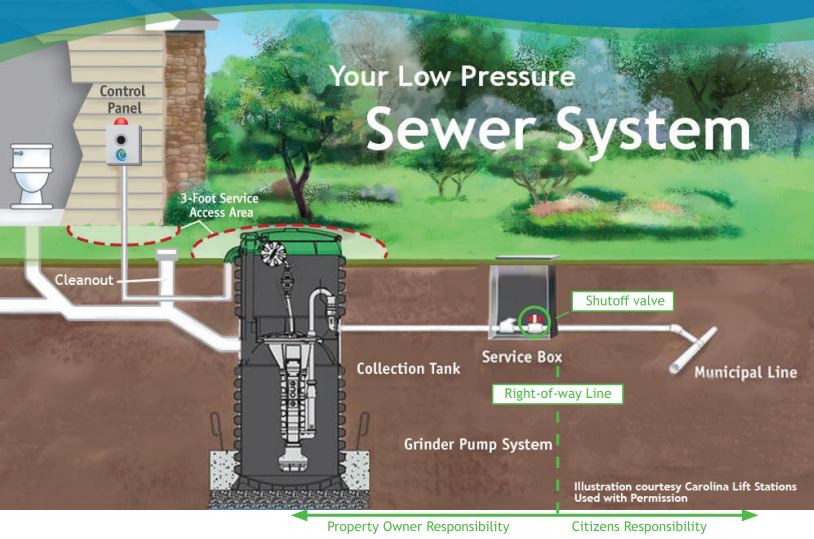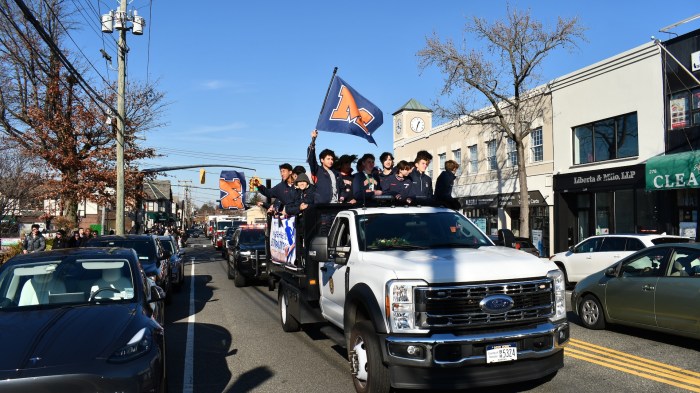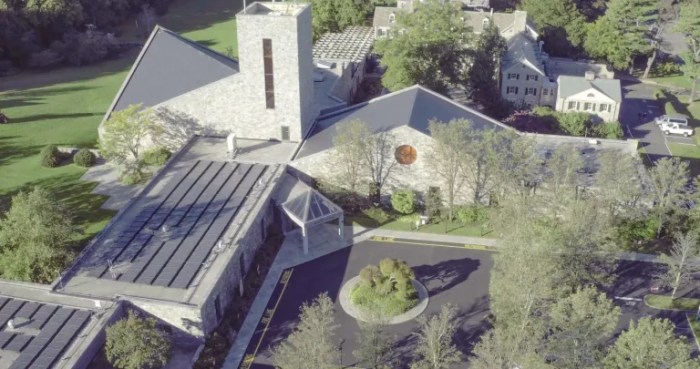
See construction starting at the end of 2023, beginning of 2024
Big numbers were bandied about. Complicated legal maneuverings were contemplated. A disruptive infrastructure project was envisioned. All this as recently as the spring of 2022.
And then, almost miraculously, the scale changed and the ends were to be achieved with much less means.
The long wished Plandome Road sewer project will become a reality in the next several years, according to stakeholders interviewed by the Manhasset Press. And it will be constructed by a much less complicated pathway than was originally thought. But first, a little history.
The Manhasset area, like much of the north shore, depends on septic/cesspool systems to deal with waste water. As early as its 1989 Master Plan, the Town of North Hempstead concluded that the lack of sewers on Plandome Road—the hamlet’s main commercial district—constrained its economic potential. In addition, a 1999 study by the Manhasset Bay Protection Committee on improving the bay’s water quality recommended sewering “to achieve nitrogen reductions consistent with the recommendations of the Long Island Sound Study.”
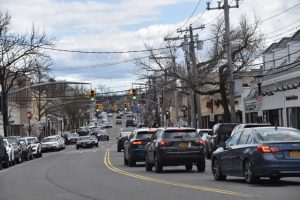
Momentum has been building in recent years. A “Manhasset Sewer Feasibility Study” by the Great Neck Water Pollution Control District (GNWPCD) was published in January 2020 and estimated a cost of $16.8 million to build out the sewer system in what it called its primary area (the business district) with a figure of nearly $24 million for the secondary (Bayview residential) area. The district has a water treatment facility on East Shore Road in Great Neck, on the western shore of Manhasset Bay.
According to the sewer feasibility study, the Plandome Road district would extend from Northern Boulevard to Vanderbilt Avenue, and include businesses on the side streets.
The sewer project was championed by the Manhasset Chamber of Commerce and the Council of Greater Manhasset Civic Associations, led by their point man, Robbie Donno. The chamber collected more than 1,800 signatures in favor of sewering and facilitated meetings involving the district and town and other elected officials, looking for ways to move the project forward and secure financing.
One complicating factor that was removed this past year was the idea that the GNWPCD needed to “annex” what its study defined as its primary area for taxing purposes. This generated conflict between the district and town attorneys.
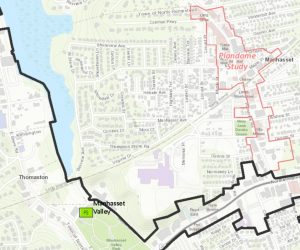
A big step forward came in the spring, when, in the final negotiations for the 2023 state budget, Assemblywoman Gina L. Sillitti (D-Port Washington) and Senator Anna M. Kaplan (D-North Hills) announced that they had secured a $5 million grant for the GNWPCD in the state Department of Environmental Conservation’s (DEC) capital projects budget. That turned out to be all the money needed to install a sewer line on Plandome Road.
The Super Speaks
GNWPCD Superintendent Chris Murphy, in an interview with the Manhasset Press, was asked for a estimate of when the project would start.
“We are currently engaging the engineers to provide a proposal for design,” he replied. “Along with this activity, we are actively working with the NYSDEC to submit and secure all grant paperwork and authorizations to proceed. Although a lot can change, at this moment, I would guess [the project would start at] the end of 2023 or the beginning of 2024.”
“Would you need any permits from the Town of North Hempstead to do the work?” he was asked.
He replied, “All we would need is a simple road opening permit. Nothing more.”

Murphy said that the district has a sewer line on Northern Boulevard serving the Manhasset businesses on that main shopping route. The district will place a small (perhaps 4-inch) pipe along its intended primary area on Plandome Road and he estimated that about 3,000 linear feet of pipe will be laid down and connect to the Northern Boulevard line. The waste will then flow to an existing pump station that will move it to the treatment facility.
Businesses on Plandome Road can choose whether or not to connect to the sewer line, and unlike in a sewer district, will not be assessed a tax. They will be charged a usage fee and will have to pay for the cost of hooking up and installing what Murphy called a grinder pump. These pumps are part of what experts call a low pressure system that is more effective than a gravity system for most areas. They chop up the waste and move it to the main line.
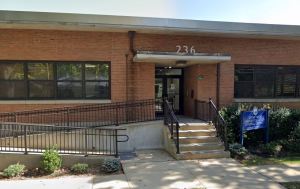
“Each one of those pumps has the ability to pump the building’s sewer almost a mile. Because it’s a low pressure sewer system, we’re going to be looking to install the majority of this through what’s called directional drilling,” Murphy explained. “We’re not going to open up a trench down the length of Plandome Road and lay a pipe in the ground. With horizontal drilling we only have to open up holes maybe every four or 500 feet, so it’s a lot less intrusive as far as traffic and pedestrians and also businesses.”
Gravity sewers, he said, need to be dug much deeper in order to follow the gradient of the land. They would also be much larger in diameter, further increasing the cost. With the shallower low pressure systems, customers won’t have to dig deep to connect to the sewer line, reducing costs and complications.
The sewer installation on Plandome is a line in the district’s 2022 budget, Murphy added. District leaders are in discussion with the DEC and will work through what he called the New York State Grant Gateway to manage the project.
“Manhasset stakeholders who are pushing the primary and secondary projects were worried because they got word that Great Neck wants to increase its sewerage and they believe that your plant will reach its capacity and they might be left out in the future. Can you respond?” Murphy was asked.
“Currently, our facilities are designed to treat 5.3 million gallons a day and we’re typically treating on average 2.6, 2.7 millions of gallons per day,” he replied. “We have quite a bit of capacity for the foreseeable future. So there’s nothing in sight that I have any concerns over that would get us to the point that we would need to look to expand.”
Murphy said the district is currently doing a study on sewering Great Neck Estates. The feasibility study for Manhasset estimates that the Plandome Road business district will generate 55,000 gallons of waste water per day.
Sewer Advantage
Per the feasibility study, “The benefits of sewering are well known and can be grouped into environmental, economic and social categories. First and foremost for this proposed sewering project is the environmental benefits. The degradation of the Long Island Sound and local embayments from excess nutrients and coliforms has been well documented.”

The study continues, “Economic benefit of sewers would be seen by the ability of local wet businesses (wet uses indicate those with higher water usage and therefore higher wastewater generation such as medical offices, restaurants, salons and laundry operations) to increase, reducing costs of hauling away septic waste and improving local conditions (surcharging manholes and odors) around the businesses.”
In addition, “Sewers will allow for restaurants to expand seating and new restaurants to locate in the area. Sewers would attract higher wastewater generators such as medical offices, salons, and laundry operations. The Town of North Hempstead would realize additional tax revenue that will offset cost of providing services to its residents and businesses. This will also eliminate the use of septic systems in businesses rear yards and alley ways thus increasing space for parking.”
The study concludes that “economic stability and future growth are constrained by a lack of wastewater treatment capacity. It is critically important to the future economic stability of the local businesses to ensure that adequate sewer capacity is available.”
